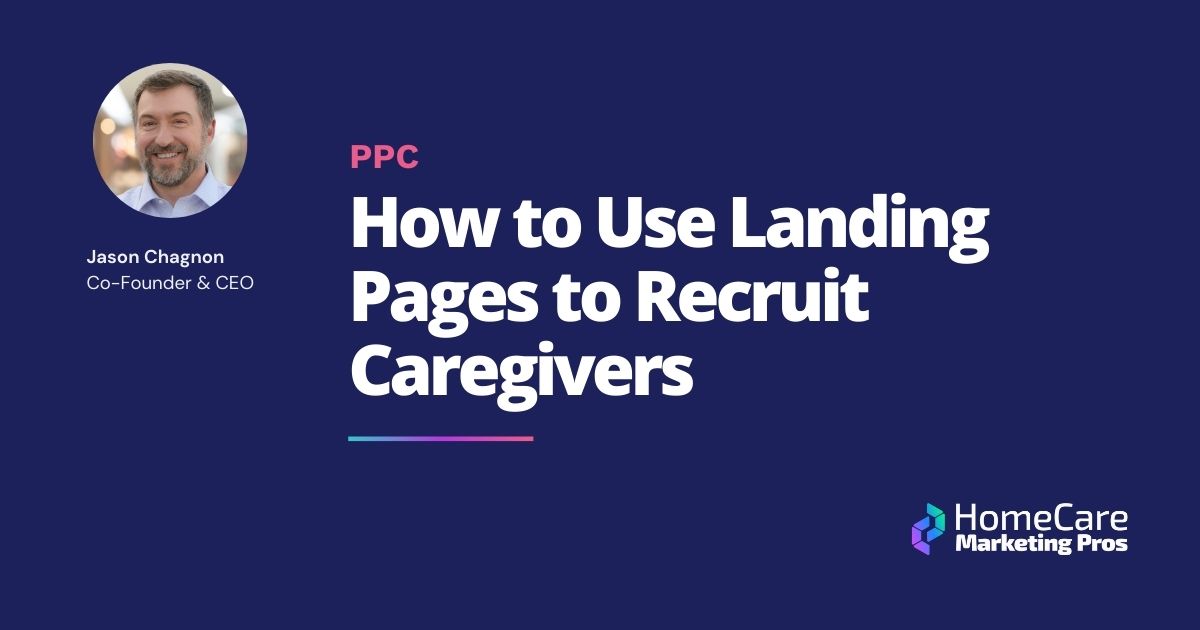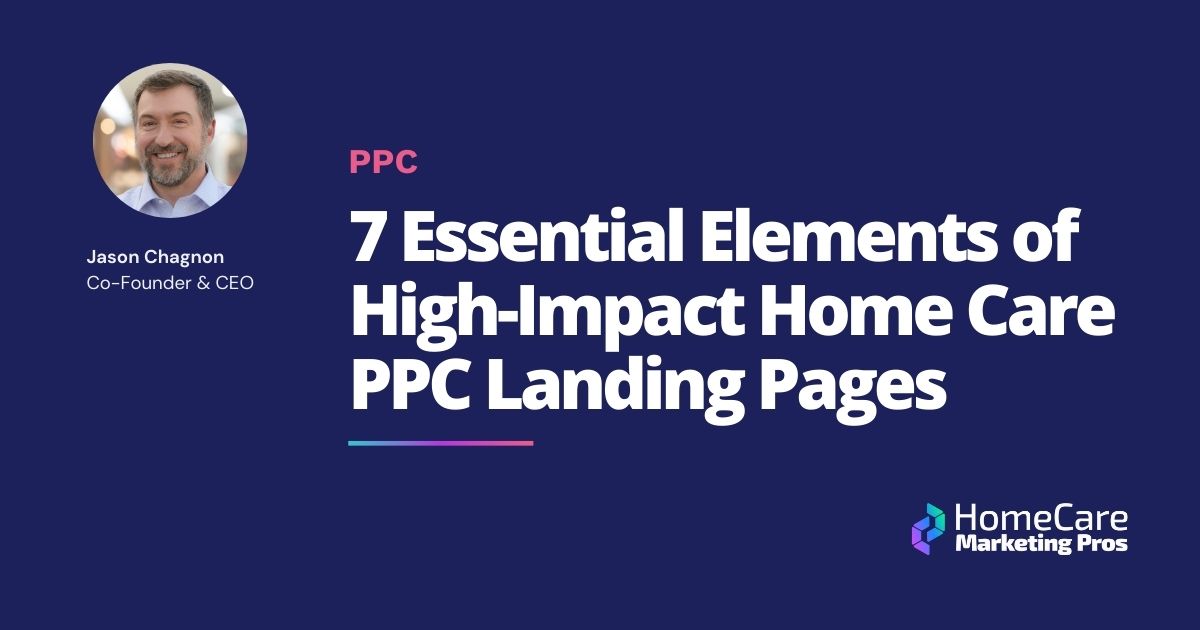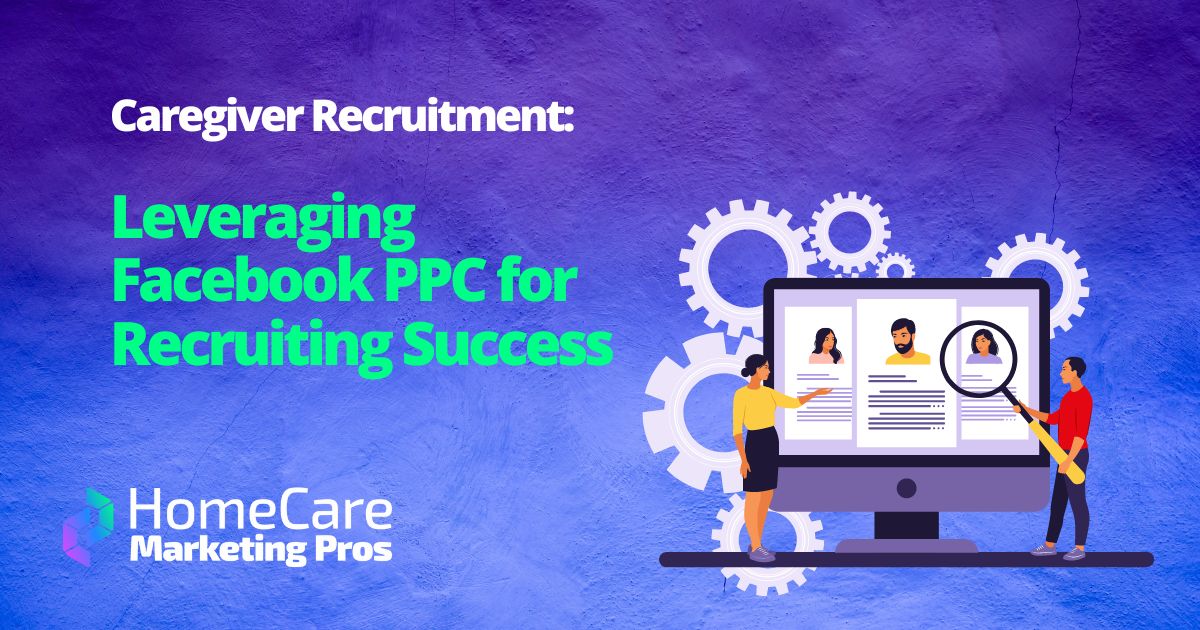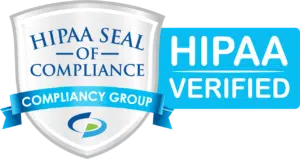PPC vs. SEO: Which Strategy Is Right for Your Home Care Business?
The pros and cons of pay-per-click advertising vs. search engine optimization—and when to use each strategy
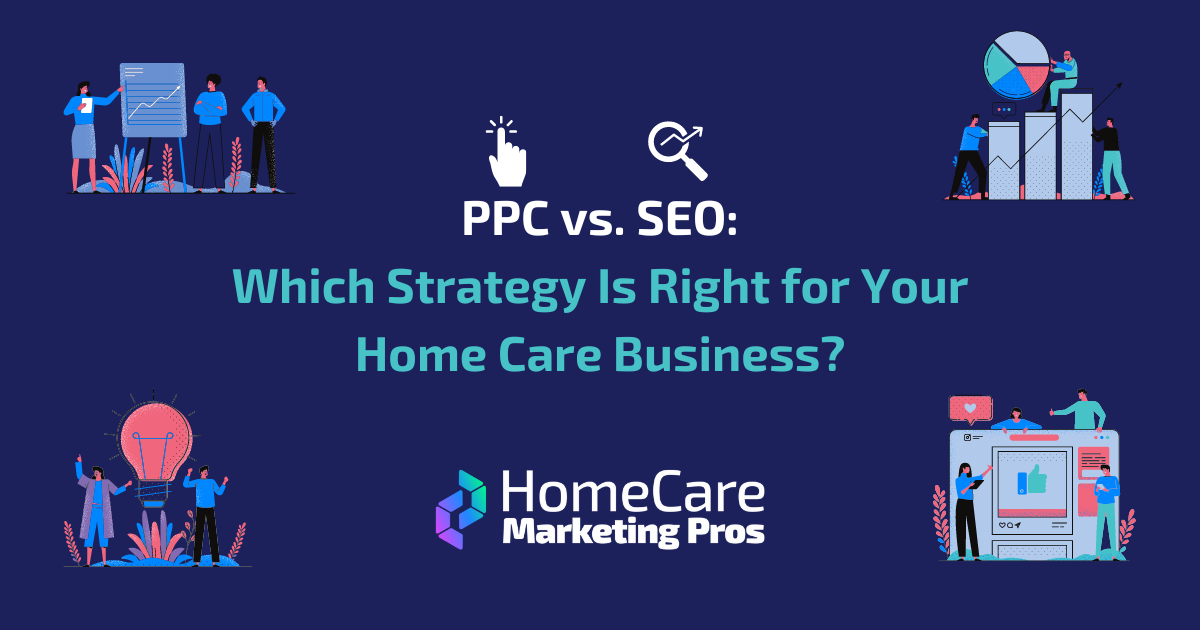
As you start researching PPC ad campaigns, you may wonder about the difference between PPC and SEO—and whether you should be bothering with both of them in your agency marketing plans. Is one better than the other? Is using both duplicative?
Let’s compare PPC and SEO and find the right solution for your agency.
What is PPC?
PPC refers to pay-per-click, which is a form of digital advertising in which the advertiser pays for the ad only when a user clicks. When executed well, it can be a very cost-effective means of delivering ad campaigns.
PPC campaigns can be run across all kinds of websites and in all formats—like social media platforms, mobile apps, and search engines. For home health agencies, we recommend paid search, or pay-per-click campaigns run on search engines, plus PPC campaigns on Facebook. Later, we’ll talk about why this is ideal for agencies.
What is SEO?
SEO stands for search engine optimization, and it’s the process of creating content on your agency website that ranks on SERPs, or search engine results pages. All pages on your website can be optimized for search.
If you search home care near me on Google, you’ll see both organic and paid search results.
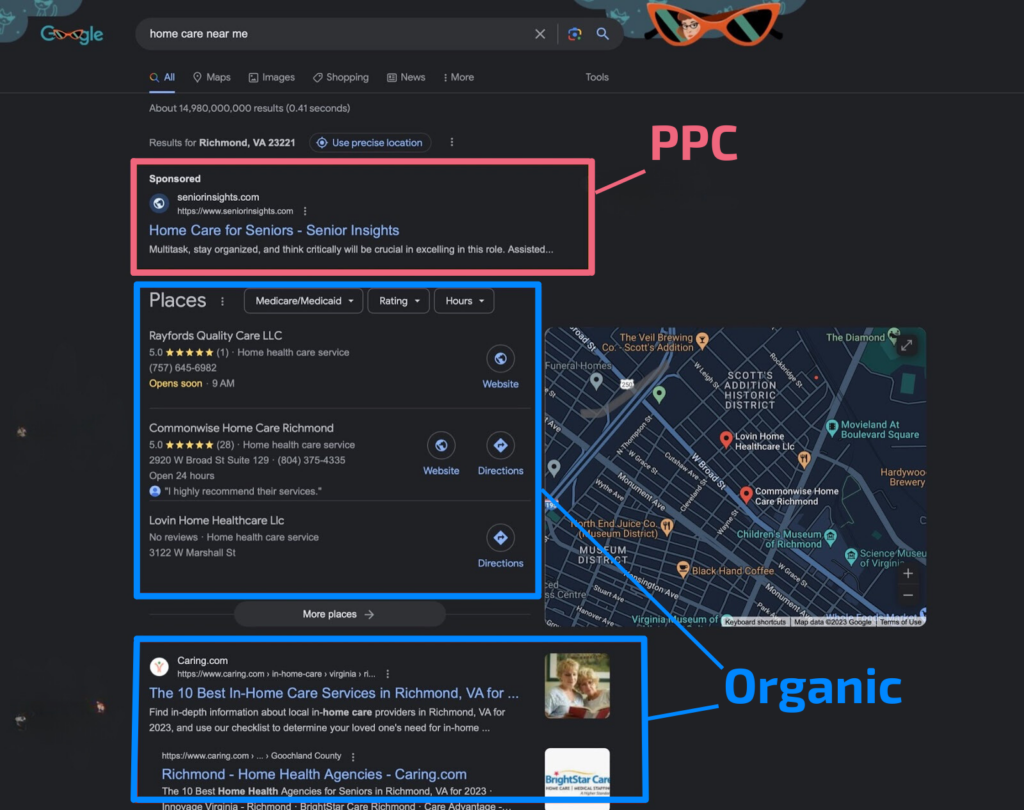
SEO vs. paid search
Both PPC and SEO are fundamental parts of digital marketing strategy. So, what do PPC and SEO have in common, and how are they different?
| PPC | SEO |
|---|---|
| Short-term and long-term strategy | Long-term strategy |
| Can be placed across many sites and platforms, including search engines and social media | Earned placements on search engines only |
| Costs are associated with running the ad campaigns | Lower costs are associated with creating SEO content |
| Optimize in real time | Wait for results following optimization |
| Requires ongoing maintenance and optimization | Requires ongoing maintenance and optimization |
Is PPC better than SEO?
Nope. It depends on your marketing goals. And in many cases, home care agencies find a combination of PPC and SEO does the trick. Using both in your marketing strategy helps you occupy more space on the SERPs.
For home health agencies, we recommend a combination of paid search on Google and Bing (the two most popular search engines) and Facebook.
- Paid search lets you engage potential clients at the very moment they’re in-market. It’s hard to beat putting your brand directly in front of a user searching the keyword senior home care.
- Facebook Ads lets you build very targeted audience segments and offers plenty of ad customization options. Plus, Facebook users tend to be very responsive to and engaged with home care ads.
When to use PPC vs. SEO
There is a time and a place for each strategy. Here’s what we recommend.
Use PPC when . . .
- You need to see results quickly. Theoretically, you can have paid search campaigns up and running within a day (though we recommend investing more time into your strategy) and driving potential clients to your site.
- You want to add in-market leads to your funnel. PPC campaigns can be targeted toward users at the very moment they’re looking for the services you offer. If you want to promote your in-home hospice services, you can bid on keywords like hospice care near me.
- You want to promote specific services. Adding a new service to your portfolio? PPC campaigns can be laser-targeted toward use based on their search intent.
- You need to test campaign messages, ad copy, and landing pages. PPC is great for A/B testing campaign components because it can be optimized mid-flight.
- Your goal is brand awareness. Showing up at the top of the SERPs can help build name recognition for your home care agency.
The disadvantages of PPC
One disadvantage of paid search is that even though this strategy can return results much quicker than SEO does, it requires a lot of planning to execute well. Another is that home care agency keywords can be very competitive, making some campaigns expensive.
Some search engine and social media users will even deliberately scroll past ads because they’re ads, preferring instead to see organic results.
Use SEO when . . .
- You want SERP staying power. Rather than paying every time you want to show up on a SERP, a strong SEO strategy can land you on page one—and keep you there—with less cost and maintenance.
- You want higher ROI. Because paid search can be a competitive business, SEO can often give you a higher ROI, if you’re willing to wait for it. You have to be willing to build great content to begin with and maintain it. SEO is not for the faint of heart.
- Your goal is brand awareness. Much like PPC, SEO can give your brand exposure.
- You want to build your agency’s reputation as a subject matter expert, a presence in your community, and a source of trustworthy information.
The disadvantages of SEO
Though the results can be great for business, SEO investment takes a long time to mature. Plus, sometimes keywords are so lucrative for paid search advertisers that organic results get bumped down the page, making them less visible. Check out this SERP for the query home care near me. The SEO results are more than halfway down the page.
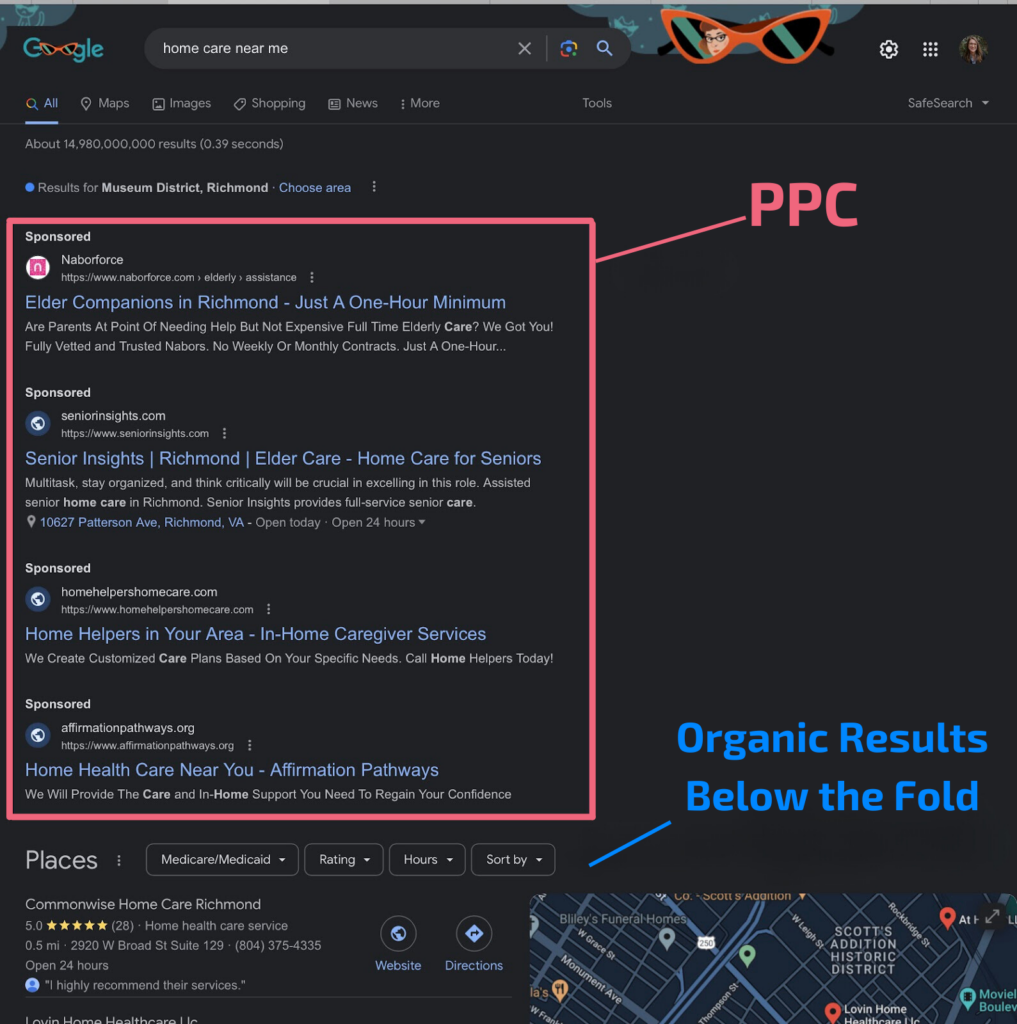
And the winner is . . .
So, which one is superior: PPC or SEO? Your winning strategy is highly dependent on your marketing goals, time, and budget. There will be a time and place for each—or both.
Ready to grow your home care agency?
Whether you are looking to use PPC, SEO, or both, we can help! Our digital marketing solutions include both professional PPC management and search engine optimized websites. To find out more, watch our walkthrough to get started!


